Analysis of NHS Privatization: Economic Factors and Social Barriers
VerifiedAdded on 2024/05/20
|6
|1355
|89
Essay
AI Summary
This essay explores the contentious issue of privatizing the National Health Service (NHS) in the UK, arguing against privatization as a solution to declining service quality. It highlights that economic factors significantly influence healthcare service quality, with rising costs potentially making healthcare unaffordable for many. Social barriers are also considered, noting that privatization could exacerbate inequalities, limiting access to customized treatment primarily to wealthier individuals, similar to the US model. The essay uses international comparisons, particularly with Japan, to demonstrate that universal healthcare access is possible without privatization. It concludes that privatizing the NHS would negatively impact service quality and accessibility, disproportionately affecting vulnerable populations and weakening the government's responsibility to its citizens.
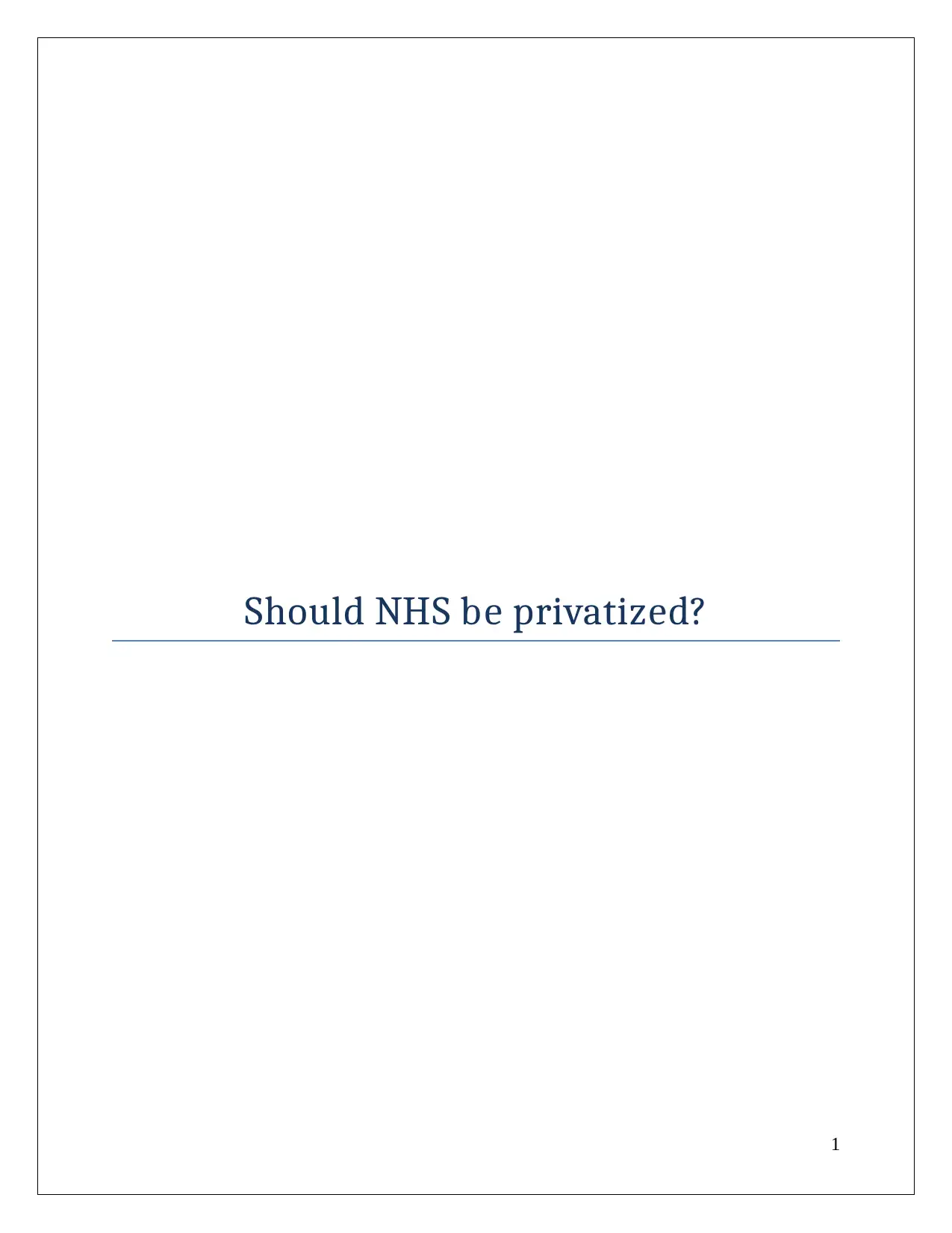
Should NHS be privatized?
1
1
Paraphrase This Document
Need a fresh take? Get an instant paraphrase of this document with our AI Paraphraser

Table of Contents
Introduction......................................................................................................................................3
Discussion........................................................................................................................................3
Conclusion.......................................................................................................................................5
Reference List..................................................................................................................................5
2
Introduction......................................................................................................................................3
Discussion........................................................................................................................................3
Conclusion.......................................................................................................................................5
Reference List..................................................................................................................................5
2
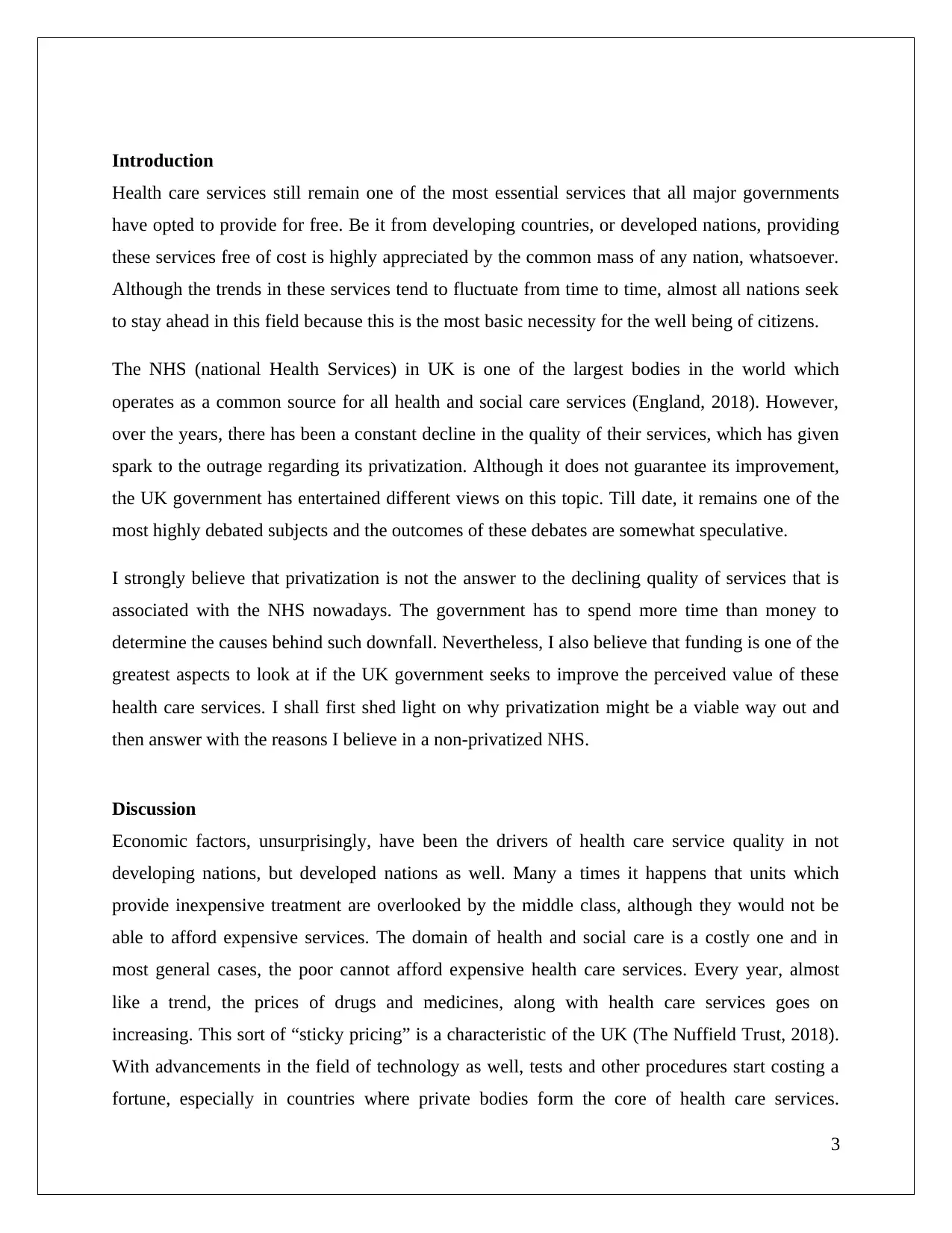
Introduction
Health care services still remain one of the most essential services that all major governments
have opted to provide for free. Be it from developing countries, or developed nations, providing
these services free of cost is highly appreciated by the common mass of any nation, whatsoever.
Although the trends in these services tend to fluctuate from time to time, almost all nations seek
to stay ahead in this field because this is the most basic necessity for the well being of citizens.
The NHS (national Health Services) in UK is one of the largest bodies in the world which
operates as a common source for all health and social care services (England, 2018). However,
over the years, there has been a constant decline in the quality of their services, which has given
spark to the outrage regarding its privatization. Although it does not guarantee its improvement,
the UK government has entertained different views on this topic. Till date, it remains one of the
most highly debated subjects and the outcomes of these debates are somewhat speculative.
I strongly believe that privatization is not the answer to the declining quality of services that is
associated with the NHS nowadays. The government has to spend more time than money to
determine the causes behind such downfall. Nevertheless, I also believe that funding is one of the
greatest aspects to look at if the UK government seeks to improve the perceived value of these
health care services. I shall first shed light on why privatization might be a viable way out and
then answer with the reasons I believe in a non-privatized NHS.
Discussion
Economic factors, unsurprisingly, have been the drivers of health care service quality in not
developing nations, but developed nations as well. Many a times it happens that units which
provide inexpensive treatment are overlooked by the middle class, although they would not be
able to afford expensive services. The domain of health and social care is a costly one and in
most general cases, the poor cannot afford expensive health care services. Every year, almost
like a trend, the prices of drugs and medicines, along with health care services goes on
increasing. This sort of “sticky pricing” is a characteristic of the UK (The Nuffield Trust, 2018).
With advancements in the field of technology as well, tests and other procedures start costing a
fortune, especially in countries where private bodies form the core of health care services.
3
Health care services still remain one of the most essential services that all major governments
have opted to provide for free. Be it from developing countries, or developed nations, providing
these services free of cost is highly appreciated by the common mass of any nation, whatsoever.
Although the trends in these services tend to fluctuate from time to time, almost all nations seek
to stay ahead in this field because this is the most basic necessity for the well being of citizens.
The NHS (national Health Services) in UK is one of the largest bodies in the world which
operates as a common source for all health and social care services (England, 2018). However,
over the years, there has been a constant decline in the quality of their services, which has given
spark to the outrage regarding its privatization. Although it does not guarantee its improvement,
the UK government has entertained different views on this topic. Till date, it remains one of the
most highly debated subjects and the outcomes of these debates are somewhat speculative.
I strongly believe that privatization is not the answer to the declining quality of services that is
associated with the NHS nowadays. The government has to spend more time than money to
determine the causes behind such downfall. Nevertheless, I also believe that funding is one of the
greatest aspects to look at if the UK government seeks to improve the perceived value of these
health care services. I shall first shed light on why privatization might be a viable way out and
then answer with the reasons I believe in a non-privatized NHS.
Discussion
Economic factors, unsurprisingly, have been the drivers of health care service quality in not
developing nations, but developed nations as well. Many a times it happens that units which
provide inexpensive treatment are overlooked by the middle class, although they would not be
able to afford expensive services. The domain of health and social care is a costly one and in
most general cases, the poor cannot afford expensive health care services. Every year, almost
like a trend, the prices of drugs and medicines, along with health care services goes on
increasing. This sort of “sticky pricing” is a characteristic of the UK (The Nuffield Trust, 2018).
With advancements in the field of technology as well, tests and other procedures start costing a
fortune, especially in countries where private bodies form the core of health care services.
3
⊘ This is a preview!⊘
Do you want full access?
Subscribe today to unlock all pages.

Trusted by 1+ million students worldwide
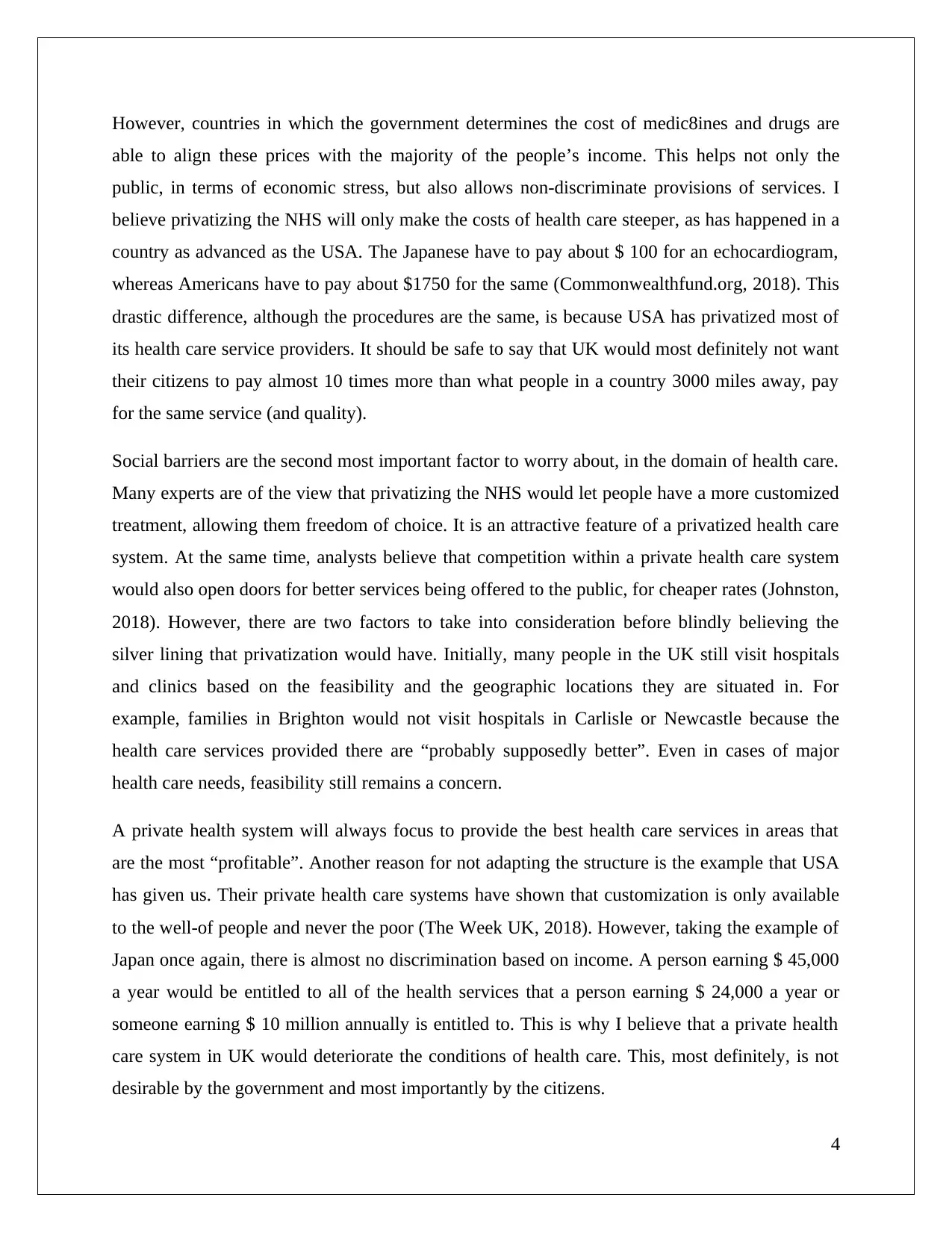
However, countries in which the government determines the cost of medic8ines and drugs are
able to align these prices with the majority of the people’s income. This helps not only the
public, in terms of economic stress, but also allows non-discriminate provisions of services. I
believe privatizing the NHS will only make the costs of health care steeper, as has happened in a
country as advanced as the USA. The Japanese have to pay about $ 100 for an echocardiogram,
whereas Americans have to pay about $1750 for the same (Commonwealthfund.org, 2018). This
drastic difference, although the procedures are the same, is because USA has privatized most of
its health care service providers. It should be safe to say that UK would most definitely not want
their citizens to pay almost 10 times more than what people in a country 3000 miles away, pay
for the same service (and quality).
Social barriers are the second most important factor to worry about, in the domain of health care.
Many experts are of the view that privatizing the NHS would let people have a more customized
treatment, allowing them freedom of choice. It is an attractive feature of a privatized health care
system. At the same time, analysts believe that competition within a private health care system
would also open doors for better services being offered to the public, for cheaper rates (Johnston,
2018). However, there are two factors to take into consideration before blindly believing the
silver lining that privatization would have. Initially, many people in the UK still visit hospitals
and clinics based on the feasibility and the geographic locations they are situated in. For
example, families in Brighton would not visit hospitals in Carlisle or Newcastle because the
health care services provided there are “probably supposedly better”. Even in cases of major
health care needs, feasibility still remains a concern.
A private health system will always focus to provide the best health care services in areas that
are the most “profitable”. Another reason for not adapting the structure is the example that USA
has given us. Their private health care systems have shown that customization is only available
to the well-of people and never the poor (The Week UK, 2018). However, taking the example of
Japan once again, there is almost no discrimination based on income. A person earning $ 45,000
a year would be entitled to all of the health services that a person earning $ 24,000 a year or
someone earning $ 10 million annually is entitled to. This is why I believe that a private health
care system in UK would deteriorate the conditions of health care. This, most definitely, is not
desirable by the government and most importantly by the citizens.
4
able to align these prices with the majority of the people’s income. This helps not only the
public, in terms of economic stress, but also allows non-discriminate provisions of services. I
believe privatizing the NHS will only make the costs of health care steeper, as has happened in a
country as advanced as the USA. The Japanese have to pay about $ 100 for an echocardiogram,
whereas Americans have to pay about $1750 for the same (Commonwealthfund.org, 2018). This
drastic difference, although the procedures are the same, is because USA has privatized most of
its health care service providers. It should be safe to say that UK would most definitely not want
their citizens to pay almost 10 times more than what people in a country 3000 miles away, pay
for the same service (and quality).
Social barriers are the second most important factor to worry about, in the domain of health care.
Many experts are of the view that privatizing the NHS would let people have a more customized
treatment, allowing them freedom of choice. It is an attractive feature of a privatized health care
system. At the same time, analysts believe that competition within a private health care system
would also open doors for better services being offered to the public, for cheaper rates (Johnston,
2018). However, there are two factors to take into consideration before blindly believing the
silver lining that privatization would have. Initially, many people in the UK still visit hospitals
and clinics based on the feasibility and the geographic locations they are situated in. For
example, families in Brighton would not visit hospitals in Carlisle or Newcastle because the
health care services provided there are “probably supposedly better”. Even in cases of major
health care needs, feasibility still remains a concern.
A private health system will always focus to provide the best health care services in areas that
are the most “profitable”. Another reason for not adapting the structure is the example that USA
has given us. Their private health care systems have shown that customization is only available
to the well-of people and never the poor (The Week UK, 2018). However, taking the example of
Japan once again, there is almost no discrimination based on income. A person earning $ 45,000
a year would be entitled to all of the health services that a person earning $ 24,000 a year or
someone earning $ 10 million annually is entitled to. This is why I believe that a private health
care system in UK would deteriorate the conditions of health care. This, most definitely, is not
desirable by the government and most importantly by the citizens.
4
Paraphrase This Document
Need a fresh take? Get an instant paraphrase of this document with our AI Paraphraser
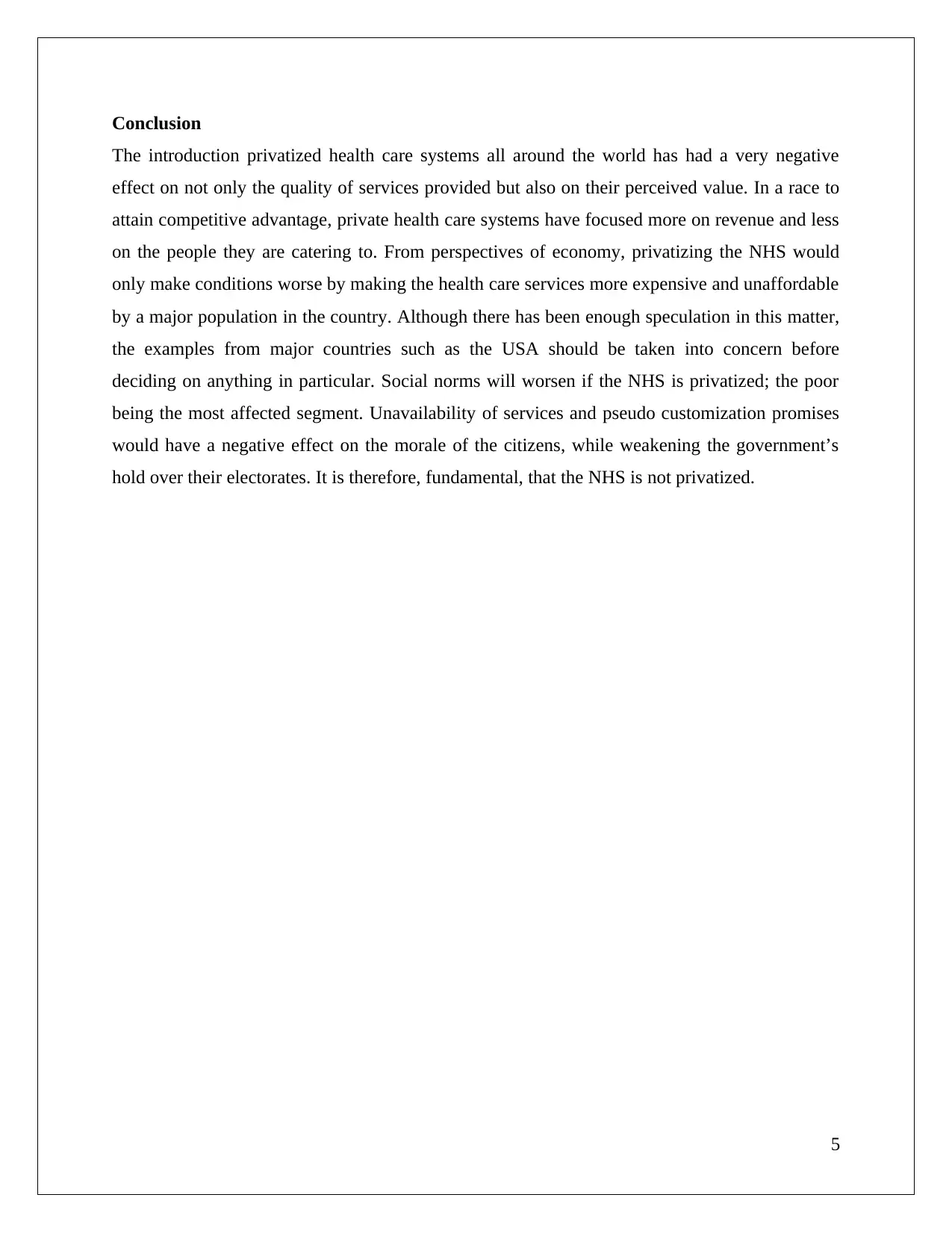
Conclusion
The introduction privatized health care systems all around the world has had a very negative
effect on not only the quality of services provided but also on their perceived value. In a race to
attain competitive advantage, private health care systems have focused more on revenue and less
on the people they are catering to. From perspectives of economy, privatizing the NHS would
only make conditions worse by making the health care services more expensive and unaffordable
by a major population in the country. Although there has been enough speculation in this matter,
the examples from major countries such as the USA should be taken into concern before
deciding on anything in particular. Social norms will worsen if the NHS is privatized; the poor
being the most affected segment. Unavailability of services and pseudo customization promises
would have a negative effect on the morale of the citizens, while weakening the government’s
hold over their electorates. It is therefore, fundamental, that the NHS is not privatized.
5
The introduction privatized health care systems all around the world has had a very negative
effect on not only the quality of services provided but also on their perceived value. In a race to
attain competitive advantage, private health care systems have focused more on revenue and less
on the people they are catering to. From perspectives of economy, privatizing the NHS would
only make conditions worse by making the health care services more expensive and unaffordable
by a major population in the country. Although there has been enough speculation in this matter,
the examples from major countries such as the USA should be taken into concern before
deciding on anything in particular. Social norms will worsen if the NHS is privatized; the poor
being the most affected segment. Unavailability of services and pseudo customization promises
would have a negative effect on the morale of the citizens, while weakening the government’s
hold over their electorates. It is therefore, fundamental, that the NHS is not privatized.
5
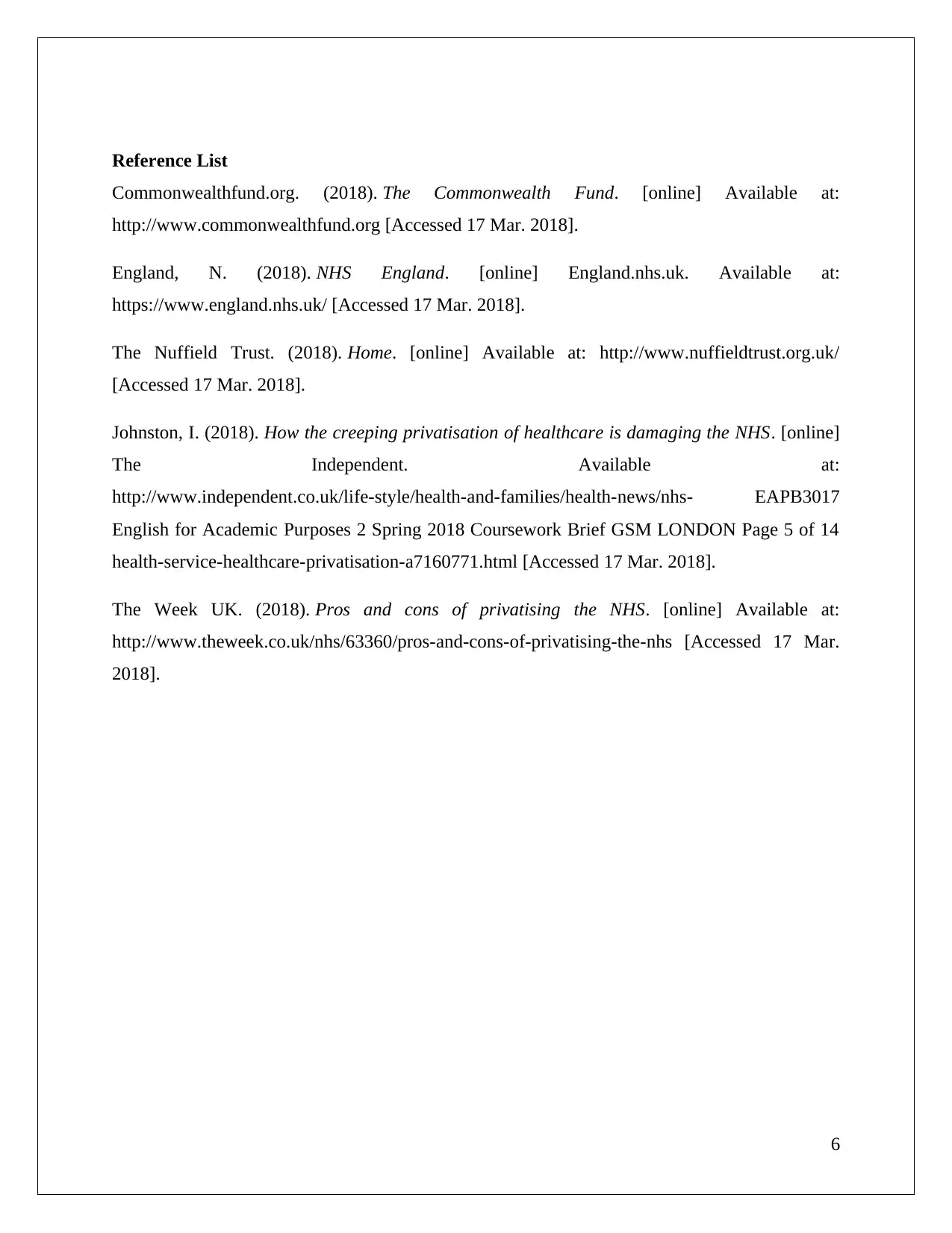
Reference List
Commonwealthfund.org. (2018). The Commonwealth Fund. [online] Available at:
http://www.commonwealthfund.org [Accessed 17 Mar. 2018].
England, N. (2018). NHS England. [online] England.nhs.uk. Available at:
https://www.england.nhs.uk/ [Accessed 17 Mar. 2018].
The Nuffield Trust. (2018). Home. [online] Available at: http://www.nuffieldtrust.org.uk/
[Accessed 17 Mar. 2018].
Johnston, I. (2018). How the creeping privatisation of healthcare is damaging the NHS. [online]
The Independent. Available at:
http://www.independent.co.uk/life-style/health-and-families/health-news/nhs- EAPB3017
English for Academic Purposes 2 Spring 2018 Coursework Brief GSM LONDON Page 5 of 14
health-service-healthcare-privatisation-a7160771.html [Accessed 17 Mar. 2018].
The Week UK. (2018). Pros and cons of privatising the NHS. [online] Available at:
http://www.theweek.co.uk/nhs/63360/pros-and-cons-of-privatising-the-nhs [Accessed 17 Mar.
2018].
6
Commonwealthfund.org. (2018). The Commonwealth Fund. [online] Available at:
http://www.commonwealthfund.org [Accessed 17 Mar. 2018].
England, N. (2018). NHS England. [online] England.nhs.uk. Available at:
https://www.england.nhs.uk/ [Accessed 17 Mar. 2018].
The Nuffield Trust. (2018). Home. [online] Available at: http://www.nuffieldtrust.org.uk/
[Accessed 17 Mar. 2018].
Johnston, I. (2018). How the creeping privatisation of healthcare is damaging the NHS. [online]
The Independent. Available at:
http://www.independent.co.uk/life-style/health-and-families/health-news/nhs- EAPB3017
English for Academic Purposes 2 Spring 2018 Coursework Brief GSM LONDON Page 5 of 14
health-service-healthcare-privatisation-a7160771.html [Accessed 17 Mar. 2018].
The Week UK. (2018). Pros and cons of privatising the NHS. [online] Available at:
http://www.theweek.co.uk/nhs/63360/pros-and-cons-of-privatising-the-nhs [Accessed 17 Mar.
2018].
6
⊘ This is a preview!⊘
Do you want full access?
Subscribe today to unlock all pages.

Trusted by 1+ million students worldwide
1 out of 6
Related Documents
Your All-in-One AI-Powered Toolkit for Academic Success.
+13062052269
info@desklib.com
Available 24*7 on WhatsApp / Email
![[object Object]](/_next/static/media/star-bottom.7253800d.svg)
Unlock your academic potential
Copyright © 2020–2025 A2Z Services. All Rights Reserved. Developed and managed by ZUCOL.




